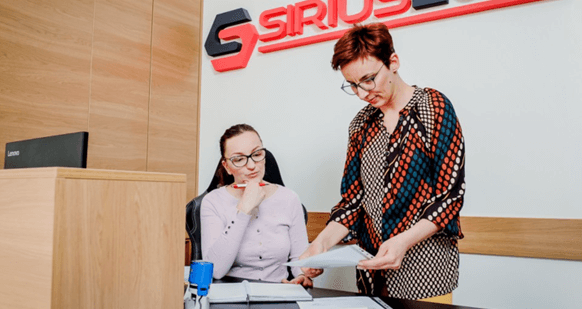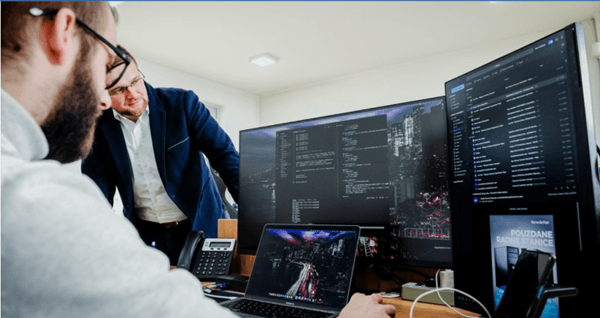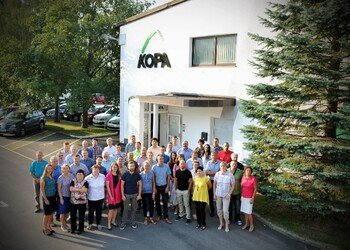Automatic clocking in and out with using Wi-Fi – When nothing else is needed


Solution: Time & Attendance
Content:
- How did Sirius 2010 merge the SPICA solution with local Wi-Fi connection?
- How the new employees love when they find out they're automatically clocked in when they get to work?
- How did they define the automatic clocking zone in the company?

Sirius 2010
- Industry: IT
- Company size: small company
- Number of employees: 18
- Feature: Sirius mainly deals with system integration
ABOUT SIRIUS 2010: Associated with global brands
 “Sirius 2010 mostly deals with system integration,
hardware, software and smart technologies” explains Duško Opajić, General
Manager. Sirius 2010, which was founded in 2007, collaborates with many
well-known IT brands, such as Lenovo, Dell HP, Bitdefender, Microsoft... and of
course SPICA.
“Sirius 2010 mostly deals with system integration,
hardware, software and smart technologies” explains Duško Opajić, General
Manager. Sirius 2010, which was founded in 2007, collaborates with many
well-known IT brands, such as Lenovo, Dell HP, Bitdefender, Microsoft... and of
course SPICA.
As an IT company, Sirius 2010 signed a technical and business cooperation agreement with SPICA and is in charge of presenting SPICA’s products for access control and time and attendance on the market of Bosnia and Herzegovina.
Challenge: How to get people to register
“As soon as workers enter the Wi-Fi zone, they are clocked in. As soon as they leave, the Wi-Fi connection is disconnected and departure from work is registered.”
Before the introduction of SPICA solution, our company used paper and pen to record working hours, which was a headache. It wasn’t easy to get people to clock in so that we were able to get information on how long they are at work, how much overtime they do, etc.
A company's system engineer, who loved to explore and search for new solutions, developed an intermediary software to integrate SPICA All Hours access solution and the local Wi-Fi network.

Solution: Wi-Fi zone for automatic clock-in
“All employees use company mobile phones. Therefore, for each device/phone, we set up a fixed IP address on our Wi-Fi network, so that we get information on which of workers access the network and when, and therefore record working hours. The same goes for private or work-related departures.
Each of the employees can indicate through an application on the phone whether it is a private or work-related departures. “At the end of the day, we know exactly which employees were in the company and for how long,” explains Duško Opajić. He adds that workers can also clock in from the field via a mobile application.
The system was designed to connect the phones to local Wi-Fi, which is in the radius of about 15 to 20 meters away from the company's center. As soon as workers enter the Wi-Fi zone, they are clocked in. As soon as they leave, the Wi-Fi connection is disconnected and departure from work is registered.
If someone returns to work after 4 p.m. to get something, they are clocked in again, but they can correct the entry through the mobile application or in SPICA All Hours. In the application, employees can also request leave, report sick, etc.
Technically, the process is organized as follows:
- The program (integration) recognizes the IP or MAC address of the user's phone when they arrive at the office. Then automatic connection to local Wi-Fi is established.
- The software then creates a clock-in event for the user.
- When the user goes out for a lunch, a lunch event is sent (at a certain period lunch is registered instead of departure).
- When the user returns from lunch, arrival is automatically registered, and later departure from work.
Is this option also used by your company’s clients? Unfortunately, despite the advantages of such a system, habits are difficult to change. “Most companies are very fond of the card system and terminals combined with cameras. Sometimes they even try to avoid installing the application on their employees’ company phones,” says Duško Opajić and adds: “We are an IT company, and we also have people working in the field. In this way, we're much more flexible. But most people are afraid of new technologies.”
This option cannot be used on private phones due to the obligations regarding personal data protection. If companies bought more phones for their employees, it would be much easier for them to control arrivals of employees to work.
It is more likely that in a year or two this will be done through the NRC reader on mobile phones. Duško Opajić: “Everything will be on mobile phones, from mobile payments to passports, ID cards and credit cards. The phone will be everything to us.”

Đorđe Radojković (left in the picture) developed an application for connecting SPICA's All Hours solution and Cambium Networks Wi-Fi solution.
Results
The advantages are obvious:
- Employees don't have to think about clocking in on arrival or departure because everything is done automatically.
- The system has contributed to the productivity of staff in administration.
- All these data are also used for calculating salaries, and with the use of the mobile application for sick leave, vacation, overtime on weekends...
- Using a mobile phone to clock in from the field has another advantage: Due to geolocation, it is very quickly possible to determine whether an employee is actually in the workplace in the field or sitting in a café.
Anecdote: “You don’t have to do anything.”
When new employees arrive, they often ask after a few days how they can clock in. The conversation usually continues like this:
- The supervisor's answer: “You have already been clocked-in.”
- A question follows: “How?”
- “Automatically via mobile phone.”
- “Ok. But how? I didn't do anything on my phone.”
- “You don’t have to do anything.”



